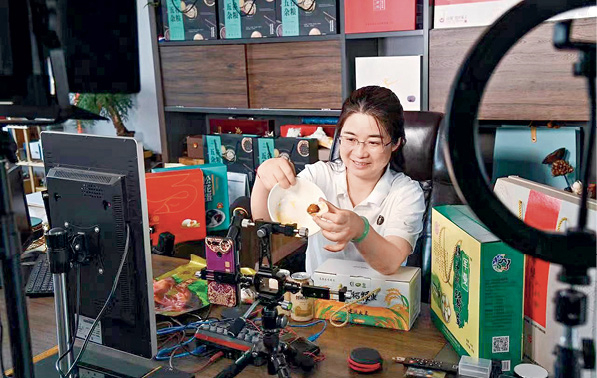
A decade ago, Lu Man, who was barely over 20 years old, quit her urban job and went to the countryside for a business adventure in raising turkey. While achieving business success, she also has led local villagers down a road to prosperity. Thanks to her contribution to local development, Lu was elected deputy to the National People’s Congress (NPC), China’s top legislature, for two consecutive terms.
Internet+, Opportunities+
Lu’s business adventure started with her boyfriend Liao Zhengjun, who found that turkey was in high demand in Shanghai, but there were few farmers dedicated to raising the poultry. Back then in 2010, Lu had a stable job in a state-owned company. Still, she quit the job and joined her boyfriend in a turkey farming venture in the remote Chenjia Village in east China’s Jiangsu Province.
Even though they were full of passion and determination, the young couple encountered many difficulties while starting the business. The biggest difficulty was the lack of money. In order to save costs, they did everything on their own. During the hardest time, they didn’t even have RMB 10 in their pockets. People around didn’t understand her decision, saying that she was wasting what she learned in college to live a hard life in the village. But Lu Man had an eye for the huge potential of the rural market.
In 2012, Lu Man was granted entrepreneurial loans under the support of the local government, which eased their financial burdens. The turkey business was growing.
The next challenge they faced was how to sell the turkey. Back then, e-commerce was burgeoning. Before starting the business, Liao Zhengjun worked in a software company. They used his software expertise and created a website to sell the turkeys. Soon, this “Internet + turkey” model proved to be successful, as orders flooded in via the platform.
Lu Man also expanded the scale of the turkey farm and adopted a circular economy model in which turkey droppings are transformed into fertilizers and methane which, in turn, generates heat to protect turkey hatchlings.
In May 2012, Lu Man established a cooperative, inviting other farmers to join her turkey raising business. She provided turkey hatchlings and know-hows for free to the farmers and invited agricultural experts to give them training lessons.
In 2014, Chenjia Village became one of the first e-commerce demonstration villages in Jiangsu Province. Thus far, 312 of the 476 local farming households have transitioned to selling their farm produce through e-commerce platforms. The annual per capita income of these households has risen from RMB 12,000 to RMB 26,000 on average.
With an area of 66.67 hectares, the cooperative Lu established now provides jobs for over 100 people, and produces nearly one-third of the supply of turkey eggs in China. Sales of the cooperative have reached RMB 100 million, helping over 2,000 people increase their incomes and achieve prosperity.
“Internet+” is the secret of Lu’s success in leading villagers to prosperity. In 2020, a piece of news caught Lu’s attention. According to the news, an elderly farmer from a poor county in Hunan Province was very anxious because she couldn’t sell the ponkan she harvested after a hardworking year. As the temperature rose, the fruit would rot, which meant all her efforts over the past year would become fruitless.
Upon hearing the news, Lu Man went straight to Hunan Province and helped the elderly farmer sell out the pokan. She sold 40,000 kg of the fruit in merely four days.
During the process, Lu Man found that the elderly farmer wasn’t the only one facing difficulties in selling fruit. There were over one million tons of unsold pokan in that county. Lu discovered the reason for this phenomenon was that there weren’t many young people in the county, and old people left behind in villages knew little about sales and marketing. This inspired the proposal she submitted to the 2023 session of the NPC – promoting e-commerce in rural areas to help with the rural revitalization drive. She hoped that the proposal would help more farmers successfully sell their products.

Lu Man is communicating with young talents in the maker space.
Attracting Talent for Rural Revitalization
In Lu Man’s view, the greatest obstacle to rural revitalization is the lack of talent, especially young talent. To attract more talent to contribute to rural development, Lu Man has made great efforts. In 2015, Lu created a venue for promoting entrepreneurship called Xiang Gelao, with the aim of attracting college graduates and skilled people who work in urban areas. She offered them free entrepreneurial advice.
In 2020, Lu set up a vocational training school named Junman to help young farmers learn business skills, knowledge of marketing, and know-how of live-streaming as a promotional medium to help young farmers succeed in argricultural businesses.
To attract more college students to help develop rural areas, Lu has been working to upgrade the “Program of College Students Voluntarily Serving Northern Jiangsu Province,” first implemented in 2005, to a national “Program of College Students Voluntarily Serving Rural Revitalization.” Under the former program, a total of 11,612 volunteers have served in northern Jiangsu Province for one to two years, and nearly 60 percent of them stayed after they finished their volunteer services. However, the program only covers a small part of China, and cannot attract enough university graduates to contribute to rural development. In Lu’s vision, by upgrading the regional program into a national one targeting rural revitalization, it will bring university students to every village across China.
A New Journey in a New Term
Talent plays an essential role in rural revitalization. Attracting talent to promote rural revitalization is one of Lu Man’s priorities. Since she was elected deputy to the 13th NPC in 2018, Lu has made 41 proposals and two motions regarding rural revitalization, young entrepreneurs, and rural modernization.
The role of a national lawmaker has broadened her horizon and thinking. “Instead of focusing on my own business, or the success of a single village, I have begun to see the entire market and the agriculture sector in a big picture,” Lu said. “I’ve learned a lot from fellow NPC deputies. I’ve also come to realize that it is necessary to know national policies and put them into practice so as to better understand agricultural modernization and explore ways to achieve it .”
China’s “No. 1 central document” for 2023, which outlines nine tasks for comprehensively promoting rural revitalization this year, stressed the importance of building a talent pool for rural areas. Lu Man welcomes such a policy. She said, “Without talent, rural revitalization won’t achieve good effects even if there is huge financial investment.”
In 2023, Lu was elected deputy to the 14th NPC. She said during the next five years of her service, she will continue to pay attention to rural revitalization and focus on ways to attract young talents and keep them in rural areas.